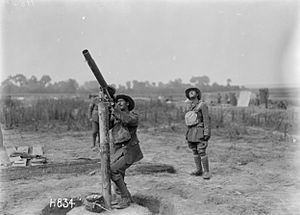New Zealand (Māori) Pioneer Battalion
| New Zealand (Māori) Pioneer Battalion | |
|---|---|

Soldiers on the anti-aircraft guard of the New Zealand Pioneer Maori Battalion camp, Bayencourt, France
|
|
| Active | 1915–1919 |
| Country |
|
| Branch |
|
| Type | Pioneers |
| Size | ~900 personnel |
| Part of | New Zealand Division |
| Engagements |
First World War |
| Disbanded | 1919 |
| Commanders | |
| Notable commanders |
George Augustus King |
First World War
The New Zealand (Māori) Pioneer Battalion, or Native Contingent and Pioneer Battalion, was a battalion of the New Zealand Expeditionary Force that served during World War I. The battalion was first raised in 1915 and served at Gallipoli and the Western Front, primarily as pioneers. "By the end of the war, 2227 Maori and 458 Pacific Islanders had served in what became known as the Maori Pioneer Battalion. Of these, 336 died on active service and 734 were wounded. Other Maori enlisted (and died) in other battalions as well."
When the First World War broke out, Māori leaders responded in various ways. Some, such as Rua Kenana Hepetipa, maintained total opposition to Māori enlistment. Others such as Āpirana Ngata, Paraire Tomoana, and Maui Pomare, were in favour of Māori enlistment and organised recruitment drives, particularly in the Waikato region of Ngāti Maniapoto and the East Coast Ngāti Porou region. Their recruitment campaign was particularly successful in Ngāti Porou, which enlisted enough men to form its own company in the battalion. Some companies were also supplemented by recruits from the Cook Islands and Niue.
By 1916 the battalion was in desperate need of reinforcements. As part of the drive to recruit more soldiers, the song Te Ope Tuatahi was composed by Āpirana Ngata. It became famous during the First World War and was adopted as the anthem of the battalion. In 1917, again in need of reinforcements, Paraire Tomoana composed an additional verse to the song, specifically encouraging enlistment in Ngāti Kahungunu, and other eastern regions of the North Island.
...
Wikipedia
